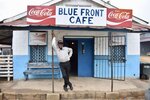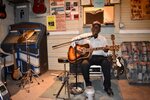

In Mississippi, Route 49 cuts straight through the Magnolia State from the Gulf of Mexico in the south 500 miles north to the Arkansas border. While less famous than the Blues Highway, Route 62 was, however, at the intersection of 49 and 62 where blues legend Robert Johnson purportedly sold his soul to the devil. Like 62, 49 has also been immortalized in song by a variety of blues artists, including Howlin’ Wolf.
Just outside Madison County, and situated halfway between Yazoo City and Jackson lies the sleepy little town of Bentonia. At first glance one realizes Bentonia’s best days are behind it and, like so many small towns in rural America. The train no longer stops to collect cotton and the classic 19th Century train depot has been torn down for reasons lost to history. On one side of the tracks a group of abandoned stores, cafes and bakery share the street with the modern Bentonia Post Office. The opposite side of the tracks has its own compliment of abandoned structures sandwiched between the Bentonia Police Station, an out-of-place contemporary bank and a traditional grain & feed store. The old cotton gin is a busy auto repair shop now keeping local residents on the road. One thing that hasn’t changed are the people, who are warm and welcoming to anyone who stops by to say hello.
In the middle of sleepy little Bentonia rests a unique and historic jewel of a structure with a degree of perfectly-preserved authenticity. The Blue Front Cafe is not a museum, nor is it tribute to a bygone time. The Blue Front Cafe is the real deal, the last operating juke joint in Mississippi, and arguably the last of its kind in the United States. The club opened in 1948 as the social hub of the town and quickly established the Bentonia School of Blues as one of the more distinct and original interpretation of the unique American art form. Over the last 70 years a variety of musicians have played the Blue Front since Carey and Mary Holmes opened a cafe known for, among other things, moonshine whiskey.
During segregation a series of convoluted rules invoked specify curfews and archaic rules. The black-owned cafe could not serve Coca-Cola and black customers were not allow to buy it. As bizarre as that sounds, Coca-Cola was reserved for white customers. Since integration, the Blue Front Cafe has boasted a Coca-Cola sponsored marquee sign over its front door, poking a finger in the eye of Mississippi’s segregationist past.
With the evolution of music and the birth of rock’n roll the blues were discovered by a wide variety of young musicians, especially in Great Britain. Bands like the Rolling Stones and John Mayall’s Blues Breakers were covering classic blues from the Deep South. Much of it arrived in England by way of merchant marines who brought albums home to port cities like Liverpool and Southhampton. Thanks to these artists the rediscovery of the blues quickly grew around the world and brought the American art form a broader international following.
The survival of the Blue Front Cafe owes much to fans traveling to the small town of Bentonia from Germany, France, The Netherlands, Great Britain and all corners of the United States. So it was no surprise that tents and RVs arrived early for the recent 70th Anniversary of the club.
Jimmy “Duck” Holmes takes it all in stride and personally welcomes everyone. Holmes is the current proprietor of the Blue Front Cafe and was the last blues musician to play the Bentonia School.
Many have made this pilgrimage dozens of times before and have become friends. In late-September, many traveled from Illinois, Alabama, Washington State, Georgia, and various parts of Mississippi. They gathered to enjoy a one-of-kind blues experience and Jimmy “Duck” Holmes never disappoints.
“Jimmy, you have no idea how much you have blessed us!”, says Wayne Yost of Springfield, Missouri, “Jimmy sat down with our son and gave him a blues lesson.” Carl Leach from Dacula, Georgia added, “ I could feel the blues resonating from the room. The history is very precious.”